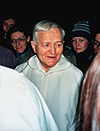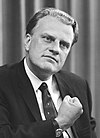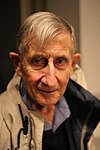Templeton Prize
| The Templeton Prize | |
|---|---|
| Description | an exceptional contribution to affirming life's spiritual dimension, whether through insight, discovery, or practical works. |
| Country | USA |
| Presented by | Templeton Foundation |
| First awarded | 1973 |
| Website | http://www.templeton.org/ |
The Templeton Prize is an annual award presented by the Templeton Foundation. Established in 1972, it is awarded to a living person who, in the estimation of the judges, "has made an exceptional contribution to affirming life's spiritual dimension, whether through insight, discovery, or practical works".[1] The prize is named after Sir John Templeton, an American-born British entrepreneur and businessman, who was knighted by Queen Elizabeth II in 1987 for his philanthropic efforts.[2] Until 2001, the name of the prize was "Templeton Prize for Progress in Religion", and from 2002 to 2008 it was called the "Templeton Prize for Progress Toward Research or Discoveries about Spiritual Realities".[3][4] It has typically been presented by Prince Philip in a ceremony at Buckingham Palace.[5][6][7]
The monetary value of the prize is adjusted so that it exceeds that of the Nobel Prizes, as Templeton felt "spirituality was ignored" in the Nobel prizes.[8] At £1,000,000, as of 2009, it is the largest single annual financial prize award given to an individual by a philanthropic organisation.[9][10] The prize is awarded "based on the decision of a panel of distinguished judges from various academic disciplines and religious traditions".[11] Hindus, Christians, Jews, Buddhists, Muslims and atheists have been on the panel of judges and have been recipients of the prize.[12]
The prize has been criticized – British biologist and antireligious atheist Richard Dawkins said in his book The God Delusion that the prize was given "usually to a scientist who is prepared to say something nice about religion".[13] Sean M. Carroll, an assistant professor in the Department of Physics at the California Institute of Technology, criticized his colleagues for taking Templeton research grants when they did not support Templeton's beliefs.[14] Martinus J. G. Veltman, the 1999 Nobel physics laurete, suggested the prize "bridg[ed] the gap between sense and nonsense.[15]
The inaugural winner of the prize, in 1973, was Mother Teresa, six years before she received the Nobel Peace Prize. She was cited by the Templeton Foundation "for her extraordinary efforts to help the homeless and neglected children of Calcutta" and for her work, which "inspired millions of others around the world".[16] The most recent recipient is French physicist Bernard d'Espagnat, whose "explorations of the philosophical implications of quantum physics have opened new vistas on the definition of reality and the potential limits of knowable science".[17]
Laureates
| Year | Laureate | Notes | Ref(s) | |
|---|---|---|---|---|
| 1973 | 
|
Mother Teresa of Calcutta | Founder of India's Missionaries of Charity, 1979 Nobel Peace Prize winner | [18] |
| 1974 | 
|
Frère Roger | Founder of the Taizé Community | [19] |
| 1975 | — | Sarvepalli Radhakrishnan | Former President of India, advocate of non-aggression with Pakistan | [19] |
| 1976 | — | Leon Joseph Cardinal Suenens | Pioneer in the Charismatic Renewal Movement | [20] |
| 1977 | 
|
Chiara Lubich | Founder of the Focolare Movement | [21] |
| 1978 | — | Prof. Thomas Torrance | Former Moderator of the General Assembly of the Church of Scotland | [20] |
| 1979 | — | Rev. Nikkyo Niwano | Cofounder of Risshō Kōsei Kai | [20] |
| 1980 | — | Ralph Wendell Burhoe | Founder of Zygon: Journal of Religion & Science | [22] |
| 1981 | — | Cicely Saunders | Hospice and Palliative Care Movement founder | [23] |
| 1982 | 
|
Rev. Dr. Billy Graham | Evangelist | [24] |
| 1983 | 
|
Aleksandr Solzhenitsyn | Soviet dissident novelist | [24] |
| 1984 | — | Rev. Michael Bourdeaux | Founder of the Keston Institute | [19] |
| 1985 | — | Alister Hardy | Founder of the Religious Experience Research Centre | [25] |
| 1986 | — | Rev. James I. McCord | Former president of the Princeton Theological Seminary | [26] |
| 1987 | 
|
Rev. Father Dr. Stanley Jaki | Benedictine monk and professor of astrophysics at Seton Hall University | [24] |
| 1988 | — | Dr. Inamullah Khan | Former secretary-general of the Modern World Muslim Congress | [27] |
| 1989 | 
|
Carl Friedrich von Weizsäcker | Physicist and philosopher | [20][A] |
| 1989 | — | Lord MacLeod of Fuinary | Founder of the Iona Community | [28][A] |
| 1990 | — | Baba Amte | Developed modern communities for people suffering from leprosy | [29][B] |
| 1990 | — | Charles Birch | Emeritus Professor at University of Sydney | [30][B] |
| 1991 | — | Chief Rabbi Immanuel Jakobovits | Chief Rabbi of Great Britain and the Commonwealth from 1967 to 1991 | [20] |
| 1992 | — | Kyung-Chik Han | Evangelist and founder of Young Nak Presbyterian Church | [31] |
| 1993 | — | Charles Colson | Founder of the Prison Fellowship | [19] |
| 1994 | 
|
Michael Novak | Philosopher and diplomat | [19] |
| 1995 | File:Paul Davies Wikipedia.jpg | Paul Davies | Theoretical physicist | [32] |
| 1996 | — | Dr. Bill Bright | Founder of Campus Crusade for Christ | [33] |
| 1997 | — | Pandurang Shastri Athavale | Social reformer, philosopher, and founder of Swadhyay Movement | [33] |
| 1998 | — | Sigmund Sternberg | Philanthropist | [19] |
| 1999 | — | Ian Barbour | Professor Emeritus of Science, Technology and Society at Carleton College | [34] |
| 2000 | 
|
Freeman Dyson | Professor Emeritus at the Institute for Advanced Study, Princeton | [34] |
| 2001 | — | Rev. Arthur Peacocke | Former Dean of Clare College, Cambridge | [5] |
| 2002 | 
|
Rev. John Polkinghorne | Physicist and theologian | [19] |
| 2003 | 
|
Holmes Rolston III | Philosopher | [35] |
| 2004 | — | George F. R. Ellis | Cosmologist and philosopher | [36] |
| 2005 | File:Townes.jpg | Charles Townes | Nobel laureate and physicist | [18] |
| 2006 | — | John D. Barrow | Cosmologist and theoretical physicist | [37] |
| 2007 | 
|
Charles Taylor | Philosopher | [13] |
| 2008 | 
|
Prof. Michał Heller | Physicist and philosopher | [6] |
| 2009 | — | Bernard d'Espagnat | Physicist | [7] |
Footnotes
- A. a Carl Friedrich von Weizsäcker and Lord MacLeod of Fuinary were jointly awarded the prize in 1989.[16]
- B. b Baba Amte and Charles Birch were jointly awarded the prize in 1990.[16]
References
- General
- "Previous winners". Templeton Foundation. Retrieved July 3, 2007.
- Specific
- ^ "Templeton Prize". Templeton Foundation. Retrieved July 2, 2009.
- ^ Cuff, Daniel (July 19, 2002). "Making a Difference; The Suitors Call in Earnest As an 80th Birthday Nears". The New York Times. Retrieved July 2, 2009.
- ^ Enman, Charles (July 8, 2008). "Templeton dies". Ottawa Citizen. Canada.com. Retrieved July 9, 2009.
- ^ Crewe, Daniel (March 15, 2003). "Just because science looks forward, religion isn't backward". The Times. Retrieved July 2, 2009.
- ^ a b Niebuhr, Gustav (March 9, 2001). "Religion Prize Won by Priest Much Involved With Science". The New York Times. Retrieved July 2, 2009.
- ^ a b Hall, John (March 12, 2008). "Cosmologist wins world's largest monetary award". The Independent. Retrieved July 2, 2009.
- ^ a b Gledhill, Ruth (March 16, 2009). "Bernard d'Espagnat wins £1m Templeton Prize". The Times. Retrieved July 2, 2009.
- ^ "Obituary - John Templeton". The Economist. July 17, 2008. Retrieved July 2, 2009.
- ^ "About the prize". Templeton Foundation. Retrieved July 3, 2009.
- ^ Goodman, Brenda (March 13, 2008). "Priest-Cosmologist Wins $1.6 Million Templeton Prize". The New York Times.
- ^ "Nomination procedure". Templeton Foundation. Retrieved July 3, 2009.
- ^ "Judges". Templeton Foundation. Retrieved July 2, 2009.
- ^ a b Jeffries, Stuart (December 8, 2007). "Is that all there is?". The Guardian. Retrieved July 2, 2009.
- ^ "The Devout Donor". Business Week. November 28, 2005. Retrieved July 2, 2009.
- ^ Veltman, Martinus. Facts and mysteries in elementary particle physics. World Scientific Publishing Company. p. 286. ISBN 981238149X.
- ^ a b c "Previous winners". Templeton Foundation. Retrieved July 3, 2007.
- ^ "Current winner". Templeton Foundation. Retrieved July 3, 2007.
- ^ a b "US scientist wins religion prize". BBC News. March 9, 2005. Retrieved July 2, 2009.
- ^ a b c d e f g Akbar, Arifa (March 15, 2007). "Philosopher wins £800,000 award for spiritual focus". The Independent. Retrieved July 2, 2009.
- ^ a b c d e Templeton, John. The Humble Approach: Scientists Discover God. Templeton Foundation Press. pp. 170–172. ISBN 1890151173.
- ^ "Lubich, Chiara - Italian Roman Catholic lay leader". Encyclopædia Britannica. Retrieved July 2, 2009.
- ^ Saxon, Wolfgang (May 16, 1997). "Ralph Wendell Burhoe, 85; Reconciled Science and Faith". The New York Times. Retrieved July 2, 2009.
- ^ Clark, David. Cicely Saunders - Founder of the Hospice Movement: Selected Letters 1959-1999. Oxford University Press. p. 131. ISBN 0198569696.
- ^ a b c "British physicist wins religious prize". BBC News. March 14, 2002. Retrieved July 2, 2009.
- ^ Hood Jr., Ralph. The Psychology of Religon. The Guilford Press. p. 248. ISBN 1572301163.
- ^ Berger, Joseph (February 27, 1986). "Princeton theologian wins Templeton Prize of $250,000". The New York Times. Retrieved July 2, 2009.
- ^ Steinfels, Peter (October 30, 1988). "Religion Notes; Prize Winner, Accused Of Bias, Collects Award". The New York Times. Retrieved July 2, 2009.
- ^ MacLeod, George. Daily Readings with George Macleod. Fount. p. 15. ISBN 0006275133.
- ^ Pandya, Haresh (February 17, 2008). "Baba Amte, 93, Dies; Advocate for Lepers". The New York Times. Retrieved July 2, 2009.
- ^ "Emeritus Professor Louis Charles Birch". University of Sydney. Retrieved July 2, 2009.
- ^ Brozan, Nadine (March 12, 1992). "Chronicle". The New York Times. Retrieved July 2, 2009.
- ^ Niebuhr, Gustav (March 9, 1995). "Scientist Wins Religion Prize Of $1 Million". The New York Times. Retrieved July 2, 2009.
- ^ a b Niebuhr, Gustav (March 6, 1997). "Leader of Spiritual Movement Wins $1.2 Million Religion Prize". The New York Times. Retrieved July 2, 2009.
- ^ a b Connor, Steve (March 23, 2000). "£600,000 prize for physicist who urges ethics in science". The Independent. Retrieved July 2, 2009.
- ^ Sewell, Helen (March 19, 2003). "Environmentalist wins $1m prize". BBC News. Retrieved July 2, 2009.
- ^ Howse, Christopher (March 20, 2004). "Sacred mysteries". Daily Telegraph. Retrieved July 2, 2009.
- ^ "British scientist wins $1m prize". BBC News. March 15, 2006. Retrieved July 2, 2009.
